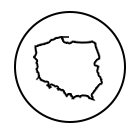Kociubowski family - murdered for helping Jews
 Place
PlaceWrzosy
 People
PeopleRoman Kociubowski
Józefa Kociubowska
Stanisław Kociubowski
– Open up, police! – came a booming voice, followed by a loud knocking or rather banging on the door. Roman Kociubowski jumped to his feet and ran to check what was going on. It was 3 a.m. on 9 February 1943. The Kociubowski’s farmstead was surrounded by German gendarmes, and a group of Ukrainian policemen were banging on the door of the Poles’ house in the village of Wrzosy. After a short while, a frightened Józefa stood by her husband. – Make us some scrambled eggs,” one of the Ukrainians demanded, turning to the Polish woman. – And turn on the gramophone! – added another. In the meantime, the others started digging a hole behind the house.
– The scrambled eggs are ready – Mrs Kociubowska informed after a while. The Ukrainians left their shovels behind and sat down at the table. When they had eaten, they announced to their hosts: „We will arrest you!”. Stanisław, the Kociubowskis’ son, could not stand the tension and threw an ashtray at one of them. The response was immediate.
The boy, who was hit by a bullet, slumped to the floor. – All right, now the others. Get out in front of the house – shouted one of the „guests”. A moment later it was all over. Józefa and Roman Kociubowski were shot and, together with Stanisław’s body, thrown into a hole they had dug. The inspection of the buildings ended with the looting of everything that, in the eyes of the invaders, represented any value. Then the house was set on fire.
The Jews to whom Józefa had carried warm soup, bread and milk to the forest every night for several months were not found. Among them were escapees from the ghetto – the family of Hersch Steinkruk (about 30 years old), owner of the „Oaza” cinema in Kowel. On an April night in 1942, together with his wife Pola and 8-year-old daughter, Hersch came to the Kociubowskis and asked them for shelter.
At that time, the Kociubowskis were in the process of building a house and they themselves were still living in a railway carriage. Roman thought and decided that he would dig a pit for the Jews under his workshop. And so he did. He placed planks on top for disguise. However, when the searches by the Germans became more frequent, about 100 metres from the buildings, in the forest, Roman dug a hiding place for the Jews. Other refugees also visited it, including a chemical engineer called Arluk and his wife Beba from Kowel and a 14-year-old girl from the village of Koszary. Every day Józefa dropped in there with food. After 9 February, feeling the breath of the Germans on their necks, the Jews went to the Kozer family for help. They were led to safety by side roads. The local gamekeeper, Paweł, helped them.
DOCUMENTS:
No extra materials